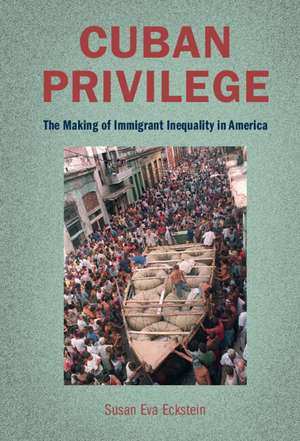Cuban Privilege: The Making of Immigrant Inequality in America
Autor Susan Eva Ecksteinen Limba Engleză Hardback – iun 2022
Preț: 237.97 lei
Nou
Puncte Express: 357
Preț estimativ în valută:
45.54€ • 47.66$ • 37.90£
45.54€ • 47.66$ • 37.90£
Carte disponibilă
Livrare economică 10-24 martie
Preluare comenzi: 021 569.72.76
Specificații
ISBN-13: 9781108830614
ISBN-10: 1108830617
Pagini: 300
Dimensiuni: 158 x 235 x 29 mm
Greutate: 0.74 kg
Editura: Cambridge University Press
Colecția Cambridge University Press
Locul publicării:New York, United States
ISBN-10: 1108830617
Pagini: 300
Dimensiuni: 158 x 235 x 29 mm
Greutate: 0.74 kg
Editura: Cambridge University Press
Colecția Cambridge University Press
Locul publicării:New York, United States
Cuprins
List of figures; Preface: Privileged Cubans; List of acronyms; 1. The making of Cuban immigration exceptionalism, 1959–1979; 2. The privileging of Cuban immigrants in the United States, 1959–1979; 3. The immigration crisis of 1980: Carter Administration privileging of Cubans anew, spillover benefits for Haitians; 4. Delinking Cubans from Haitians: The deepening of Cuban privileging and the turn against Haitians under the Reagan and Bush I administrations; 5. Taking with one hand, giving with the other: Clinton administration retraction and expansion of Cuban immigrant entitlements; 6. From extension to retraction of Cuban immigrant entitlements amidst mainly exclusion of Haitians: The George W. Bush and Barack Obama administrations; 7. From heaven to hell under the Trump administration: Walls for Cubans after all; 8. Exceptionalism in practice? Actual immigration, lessons learned.
Recenzii
'Susan Eckstein has given the first comprehensive account of U.S. immigration policy’s treatment of Cubans, who for more than half a century enjoyed incredible privileges compared to other immigrants. Her account is an indispensable road map for understanding the growth of the Cuban diaspora in the United States and how it came to enjoy a powerful place in American politics.' William M. LeoGrande, American University
'A fascinating account of how Cuban immigrants’ success resulted from decades of policies that worked to their advantage. Eckstein also convincingly reveals how immigration policies do much more than regulate entrance and exit. They double as foreign policy and social welfare policy and once they are in place, they are very hard to reverse. Rigorously researched and historically grounded, this book adds a new, important twist to debates on why immigrant integration and social mobility come easily to some groups and evade others.' Peggy Levitt, Wellesley College and Harvard University
'In Cuban Privilege, Susan Eckstein lays bare the political origins of Cubans’ preferential access to immigration visas and federal entitlements in America’s Cold War politics, enabling them not only to create a prosperous economic enclave but also a potent electoral block that compelled successive governments to maintain and even expand their privileges over nearly six decades. After reading the book, one is compelled to ask not why other immigrants can’t be more like Cubans, but why the government can’t treat other groups like Cubans.' Douglas S. Massey, Princeton University
'Cuban Privilege is the story of how eleven presidents from Eisenhower to Obama accorded Cuban immigrants privileges denied to all other immigrants. By contrasting the different treatment afforded to Dominican and Haitian immigrants, Eckstein demonstrates the interplay of race, foreign policy and politics in our immigration system. A terrific history and sociology of immigration policy, this book is a window into the realities of America’s messy and unequal immigration policies. Must reading for the immigration expert and the general reader alike.' Mary C. Waters, Harvard University
'A fascinating account of how Cuban immigrants’ success resulted from decades of policies that worked to their advantage. Eckstein also convincingly reveals how immigration policies do much more than regulate entrance and exit. They double as foreign policy and social welfare policy and once they are in place, they are very hard to reverse. Rigorously researched and historically grounded, this book adds a new, important twist to debates on why immigrant integration and social mobility come easily to some groups and evade others.' Peggy Levitt, Wellesley College and Harvard University
'In Cuban Privilege, Susan Eckstein lays bare the political origins of Cubans’ preferential access to immigration visas and federal entitlements in America’s Cold War politics, enabling them not only to create a prosperous economic enclave but also a potent electoral block that compelled successive governments to maintain and even expand their privileges over nearly six decades. After reading the book, one is compelled to ask not why other immigrants can’t be more like Cubans, but why the government can’t treat other groups like Cubans.' Douglas S. Massey, Princeton University
'Cuban Privilege is the story of how eleven presidents from Eisenhower to Obama accorded Cuban immigrants privileges denied to all other immigrants. By contrasting the different treatment afforded to Dominican and Haitian immigrants, Eckstein demonstrates the interplay of race, foreign policy and politics in our immigration system. A terrific history and sociology of immigration policy, this book is a window into the realities of America’s messy and unequal immigration policies. Must reading for the immigration expert and the general reader alike.' Mary C. Waters, Harvard University
Notă biografică
Descriere
The first book to document the unique yet strategic entitlements granted to Cubans over other immigrants to the US.
